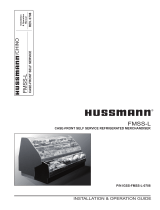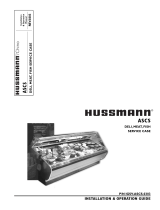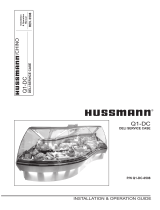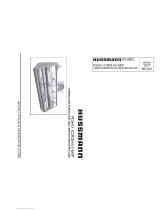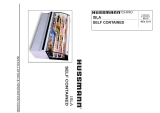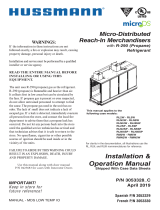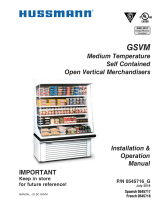Page is loading ...

R3HV-WD-B/CR3HV-WD-B, R3HV-WD (CR3HV-WD)-D
INSTALLATION & OPERATION GUIDE
R3HV-WD-B/CR3HV-WD-B, R3HV-WD
(CR3HV-WD)-D
REFRIGERATED HIGH VOLUME WIDE STRAIGHT OR CURVED GLASS, SERVICE-SELF-SERVICE
BAKERY MERCHANDISER, COMBINATION SERVICE
AND SELF-SERVICE DELI CASE
WITH REAR STORAGE
/CHINO
R3HV-WD-B/CR3HV-WD-B,
R3HV-WD (CR3HV-WD)-D
REFRIGERATED HIGH VOLUME WIDE STRAIGHT OR CURVED
GLASS, SERVICE-SELF-SERVICE BAKERY MERCHANDISER,
COMBINATION SERVICE AND SELF-SERVICE DELI CASE
WITH REAR STORAGE
Installation
& Operation
Manual
REV. 1123

1. General Instructions
/CHINO
A publication of HUSSMANN®Chino
13770 Ramona Avenue • Chino, California 91710
(909) 628-8942 FAX
(909) 590-4910
(800) 395-9229
www.hussmann.com
This Booklet Contains Information on:
R3HV-WD-B/CR3HV-WD-B: Refrigerated High Volume Wide Straight or Curved Glass,
Service-Self-Service Bakery Merchandiser
R3HV-WD/CR3HV-WD: Refrigerated high volume wide straight or curved glass service-
self service deli merchandiser
Shipping Damage
All equipment should be thoroughly examined for shipping damage before and during
unloading.
This equipment has been carefully inspected at our factory and the carrier has assumed
responsibility for safe arrival. If damaged, either apparent or concealed, claim must
be made to the carrier.
Apparent Loss or Damage
If there is an obvious loss or damage, it must be noted on the freight bill or express
receipt and signed by the carrier’s agent; otherwise, carrier may refuse claim. The
carrier will supply necessary claim forms.
Concealed Loss or Damage
When loss or damage is not apparent until after equipment is uncrated, a claim for
concealed damage is made. Make request in writing to carrier for inspection within 15
days, and retain all packaging. The carrier will supply inspection report and required
claim forms.
Shortages
Check your shipment for any possible shortages of material. If a shortage should exist
and is found to be the responsibility of Hussmann Chino, notify Hussmann Chino. If such
a shortage involves the carrier, notify the carrier immediately, and request an inspection.
Hussmann Chino will acknowledge shortages within ten days from receipt of equipment.
Hussmann Chino Product Control
The serial number and shipping date of all equipment has been recorded in
Hussmann’s files for warranty and replacement part purposes. All correspondence
pertaining to warranty or parts ordering must include the serial number of each piece
of equipment involved, in order to provide the customer with the correct parts.
Keep this booklet with the case at all times for future reference.
2

2. Table of Contents
1. General Instructions...............................................................2
2. Table of Contents ...................................................................3
3. Cut and Plan Views ................................................................4
4. Installation...............................................................................5
5. Plumbing ...............................................................................12
6. Refrigeration .........................................................................13
7. Electrical................................................................................15
8. User Information...................................................................16
9. Wiring Diagrams Index……...............................................19
10. Wiring Diagrams.................................................................20
11. Troubleshooting Guide ......................................................26
12. Appendices .........................................................................28
13. Spec Sheet.. ........................................................................31
3

3. Cut and Plan Views
SUPPORT
LEGS REAR
CLOSE-OFF
FRONT
CLOSE-OFF
37/8"
7"
55 1/8"
21"
12 1/2"
17"
FRONT OF CASE
(LENGTH VARIES)
14 1/4"
6"
15"
11/8"
11/8"
Elect
Drop
Refrig
Drop
Upper
Drain
Lower
Drain
32 (4')
44 (6')
53 (8')
65 (12')
56 (8')
77 (12')
7(4')
41 (6')
CR3HV-WD and R3HV-WD Planview
4

PLEASE READ THESE
INSTRUCTIONS COMPLETELY BEFORE
BEGINNING CASE INSTALLATION.
Location
The refrigerated merchandisers have been designed for
use only in air conditioned stores where temperature and
humidity are maintained at or below 75°F and 55% relative
humidity. DO NOT allow air conditioning, electric fans, ovens,
open doors or windows (etc.) to create air currents around
the merchandiser, as this will impair its correct operation.
Product temperature should always be maintained at a
constant and proper temperature. This means that from the
time the product is received, through storage, preparation
and display, the temperature of the product must be
controlled to maximize life of the product.
Uncrating the Stand
Place the fixture as close to its permanent position as
possible. Remove the top of the crate. Detach the walls
from each other and remove from the skid. Unbolt the case
from the skid. The fixture can now be lifted off the crate
skid. Lift only at base of stand!
Exterior Loading
These models have not been structurally designed to
support excessive external loading. Do not walk on their
tops; This could cause serious personal injury and damage
to the fixture.
Leveling
IMPORTANT!: TO AVOID REMOVING CONCRETE
FLOORING, WHEN INSTALLING A LINEUP OF CASES,
IT IS IMPERATIVE THAT THE HIGHEST SPOT OF THE
STORE FLOOR IN THE AREA WHERE THE CASES
ARE TO BE SET IS DETERMINED. BEGIN SETTING
THELINEUPWITHTHECASETHATISNEARESTTO
THE HIGHEST PART OF THE FLOOR. IF A WEDGE IS
A PART OF THE LINEUP NEAR THE HIGH SPOT, SET
IT FIRST.
IMPORTANT!: WHEN REMOVING LOOSE PARTS
FROM INSIDE OR ON TOP OF THE CASE SUCH AS
INSTALLATION KITS, HARDWARE OR FASTENERS,
ICE PANS, DISPLAY PANS, SPLASH GUARDS, AND
INSTRUCTION MANUALS TO GAIN ACCESS TO THE
SIDE BULKHEADS AT EACH END OF THE CASE OR
TO BEGIN PREPARATION FOR INSTALLATION: DO
NOT LOSE THEM OR PUT THEM WHERE THEY CAN
BECOME DAMAGED.
LEVELING: ALL CASES WERE LEVELED AND JOINED
WHERE NECESSARY PRIOR TO SHIPMENT TO
ENSURE THE CLOSEST POSSIBLE FIT WHEN CASES
1. It is imperative that the cases be leveled from front
to back and side to side as they are being joined
beginning with the first case that is set in place.
Remember: the first case in a line-up to be set
should be the one closest to the highest spot of
the store floor. A level case is necessary to ensure
proper operation, water drainage, and glass
alignment. Remove any skids or shipping supports
that are under the legs. Leave the leg supports
attached to the sides of the legs on the case until the
case has been set and leveled.
Front to back plumb should be checked by
placing the level on the top of the side bulkhead of
the lower case after the lower deck pans have been
removed. Make sure that the area on the bulkhead
where the level is placed is smooth and free of
debris. Check plumb at both ends of the case at the
side bulkheads.
Side to side plumb should be checked both at
the front and rear of the case. At the front, a level
can be placed on the stainless steel liner cap at the
front of the lower case interior or on the stainless
steel bumper box between the bumper and front
Plexiglass. At the rear of the case, place the level on
the stainless steel rear ledge. Check plumb at the
center and ends to ensure that the case is truly level
and that all legs of the case are supporting the weight
of the case equally, front and rear and side to side.
2. Set the first case, and adjust the legs over the
highest part of the floor so that case is level as
described above. Prevent case damage: if lifting the
case, it must be raised under the legs, the leg tubes
or by
the use of the wood 2" x 6" or 2" x 4" leg braces if
applicable. Remove the side and back leg braces
after thecaseisset.
3. Set the second case as close as possible to the first
case, and level the second case to the first using the
instructions in step 1. This will be a mock-up only. The
final leveling of the case will be rechecked once they
are bolted together in steps 7 and 8.
4. Apply masking tape 1/8" in from end of case on
the inside and outside rear mullion and to the side
bulkheads on both cases to be joined. The tape will
minimize cleanup from sealant overflow when the
cases are drawn together. (It can also be left in place
on the upper case mullions and exterior bodywork for
finish caulking with silicone in step 9.)
4. Installation
ARE JOINED IN THE FIELD. WHEN JOINING, USE A
CARPENTERS LEVEL AND SHIM LEGS ACCORDINGLY.
CASES MUST BE RAISED CORRECTLY: LIFT UNDER
LEGS OR WOOD LEG BRACES WHERE SUPPORT IS
BEST, TO PREVENT DAMAGE TO THE CASE.
5

5. Apply liberal beads of case joint sealant (butyl) to
the areas (solid dark lines) shown in the diagram
below (Fig.2, #1) of the first case.
DO NOT USE PLUMBER’S PUTTY!
LEGEND
Grey Silicone
as needed
Joint Trim
Butyl Sealant
Fig.2, #1
DO NOT USE PLUMBER’S PUTTY!
Plumber’s putty will not allow the cases to be fully
drawn together which will cause gaps between the cases
resulting in poor bodywork fit, finish and case sealing.
Only use Plumber’s putty where necessary after the
cases have been bolted and drawn tightly together.
It is the contractor’s responsibility to install
case(s) according to local construction and
health codes
6. Slide the second case up to the first case snugly.
Then align the second case to the first case so that
the glass, front bumper, bodywork, and top are
flush.
7. To compress the sealant at the joints, use two
Jurgenson®or similar hand screw type wood
clamps. Make sure the case is level from front to
back and side to side per the instructions in step 1. If
using clamps on the plastic sprayed interior liner use
scrap wood (as wide as possible) under the clamps
so that the liner is not damaged. Be careful to
observe the area where the clamp is being tightened
so that the case is not damaged as pressure is
applied.
8. Attach cases together via 2 bolts located in the end
leg tubes at the base of the cases and 1 bolt in the
rear raceway end brackets. On fixed glass Meat and
Fish cases, there are 2 additional bolts in the top of
the case that are accessible by removing the top
insert. The top insert is removed by pushing up on
the bottom side of the insert from inside of the case.
9. Remove the masking tape from the bulkheads only
and trial fit the stainless steel bulkhead caps. Once
proper fitisconfirmed, apply a bead of silicone to
the tops of the bulkheads and install the stainless
steel bulkhead cap. Also, sparingly apply silicone to
seal case interior and exterior bodywork as needed
to ensure a water-tight seal, and a cleanable and
professional appearance. Use a finger in a clean
rag, as you go, to smooth the silicone as thin as
possible on the inside and outside of the case, while
it is still fluid. (Apply additional silicone if necessary).
Immediately remove the masking tape applied in
step 3.
GLASS BREAKAGE MAY OCCUR!
Retighten glass along glass clamp after
leveling and first time case is brought
to full operating temperature!
DANGER
Installation (Cont'd)
6

Installation (Cont'd)
Glass Installation/Balancing
Glass Adjustment
The top cylinders, which allow the raising and lowering of
the glass, have been carefully tested for proper tension.
However, during shipment, the lubricant inside may have
settled. This settling may cause excessive or uneven
tension on the glass - to the point of breakage. Perform
the three easy steps listed below before completely raising
the front glass.
1. Slowly raise and lower each glass section 6 times to
a height of 6 inches.
2. Increase the height to 12 inches, and raise and
lower the glass 6 more times.
3. Finally raise the glass to its full extension, and lower.
These steps should release any settled lubricant within the
cylinders and prevent any stress on the front glass.
Additionally, after installing NEW cylinders, it is
advisable to perform these three easy steps before
completely raising the front glass.
WARNING
Cylinders are a “wear” item
Glass is HEAVY and can cause bodily harm.
Cylinders are designed to:
•Support the glass when fully open
•Allow the glass to close slowly
Have your service Contractor replace
the cylinders when required
READ BEFORE RAISING FRONT GLASS
ON R3HV-D or CR3HV-D:
READ BEFORE RAISING FRONT GLASS :
Hex screws along glass clamp may
have loosened during shipping!!
Retighten all glass clamp screws
before opening glass!
IMPORTANT
INFORMATION
Level Minitop Hardware
IF GLASS DOES NOT CLOSE/STAY OPEN
PROPERLY - Level MINI TOP HARDWARE
During shipping, it is possible that the mini top hardware
housing the pistons and armature has been jostled out of
position. This affects the opening angle of the glass.
1. Be sure mini top hardware is level front to back by
placing a level along the top of the mini top housing
at each hinge location. If it is not, you will need
a shim kit before you can correct. Order from
Hussmann.
2. Remove top glass and panel at top of hardware
housing.
3. Mark position of hardware (glass) in relation to case
before loosening hex screw using masking tape
applied on mini top hardware and case, and pen.
Hex screw allows realignment of glass angle and
position front to back.
4. Raise glass and loosen hex screw. (See diagram on
page 8.)
5. Shim to adjust until level using shims available from
Hussmann (16 or 20 gauge stainless steel).
6. Check angle by using level placed on top of mini top
hardware.
Note: A 6" level will fit perfectly within access area.
7. Tighten hex screw.
8. If there is still a problem with glass staying open
over-level by adding an addition shim under front of
case.
NOTE: Before making any of the recommended adjustments,
Verify that the case(s) have been leveled properly.
7

Installation (Cont'd)
Strategies for correcting Glass bounce and opening overlap problems
Adjust hinges FRONT – BACK.
Adjustments
Before calling for service if something seems wrong, check the following:
1.Inspect the gap between the glass panels
A.If pinched at the top: Gap is more narrow at the top than at the bottom.
Correct UNEVEN GAP and opening overlap problems by Vertically adjusting the hinge(s) to even the gap
Adjust center hinge (Outer hinges stationary) As this diagram indicates, raising the middle hinge draws
the bottom edges closer together. Whereas lowering the hinge widens the gap. (See Vertical Adjustment
on page 8)
Top edges of glass (hinge side)
Bottom edges of glass
Hinge
Hardware
B. If pinched at the bottom: Gap is more narrow at the bottom than at the top.
Adjust outside hinges (Center hinge stationary). This diagram indicates that raising the outside hinges
widens the gap at the bottom; whereas, lowering the outside hinges will draw the bottom edges closer
together.
(See Vertical Adjustment on page 8).
Which hinge(s) should I adjust first?
In most cases the center hinge is the first candidate, but if it cannot be adjusted because, either the
adjustment screw is “maxed” out or no additional shims can be added or removed, then obviously the outer
hinges must be adjusted
2. Check closing action of the glass panel
Test each panel by gently pushing it to close. Does the glass panel bounce or wobble as it closes?
A glass panel that does not close smoothly and neatly, most likely is misaligned with the front edge of the glass
and the surface or edge which it closes upon. Refer to diagram below.
8

3. Strategies for correcting Glass Bounce and opening overlap problems
Adjust hinges FRONT - BACK.
A. Adjust center Hinge (Outer hinges stationary).
As this diagram indicates, pulling the middle hinge further back, pulls the inside edges closer to the
surface or edge which the glass rests upon. And pushing the middle hinge to the front, pushes the inside
edges further away from the surface or edge which the glass rests upon. (See Vertical Adjustment of
Glass)
B. Adjust outside hinges (Center hinge stationary)
As this diagram indicates, pulling the outside hinge further back, pulls the outside edge closer to the
surface or edge which the glass rests upon. And pushing the middle hinge to the front, pushes the inside
edges further away from the surface or edge which the glass rests upon.
Which hinge(s) should I adjust first?
In most cases the center hinge is the first candidate, but if the arm/minicam is at its maximum or minimum
position, then obviously the outer hinges must be used. (See Vertical Adjustment of Glass)
Vertical Adjustment of Glass
A. Adjust outside hinges (Center hinge stationary)
This diagram indicates that raising the outside hinges widens the gap at the bottom; whereas, lowering the outside
hinges will draw the bottom edges closer together.
Which hinge(s) should I adjust first?
In most cases the center hinge is the first candidate, but if it cannot be adjusted because, either the adjustment
screw is “maxed” out or no additional shims can be added or removed, then obviously the outer hinges must be
adjusted.
Installation (Cont'd)
9

Installation (Cont'd)
•Vertical Adjustment
1. Remove
top glass
and panel
enclosing
mini-top
hardware.
2. Lift open
glass panel(s)
and relieve
tension on
hinge.
(1/4” allen). shims as needed.
(see note on shims
below)
3. Loosen hex screw 4. Add or remove 5. Close glass panel(s)
and check alignment
Retighten hex screw
and reinstall removed
NOTE: Standard shims thickness is 1/16”
Back of
Case
Joint Trim
After cases have been leveled and joined, and refrigeration,
electrical, and waste piping work completed, install the
splashguards and joint trim where necessary. Fasten the
splash guards along the top edge, or center, with 3/8"
long sheet metal screws. If needed, use silicone sparingly
to caulk the joint trim and exterior body panels with an
appropriate colored silicone to ensure that a cleanable
and professional appearance is achieved. Use a finger in
a clean rag, as you go, to create smooth and neat joints,
while the silicone is still fluid.
DO NOT SEAL JOINT TRIM OR SPLASHGUARDS TO
THE FLOOR!
10

Installation (Cont'd)
Bumper Installation Instructions
Step 1: Make sure the aluminum channel
and end caps are installed.
Step 2: Use silicone lubricant to help the
bumper slide into the channel.
Step 3: Starting on one end: while inserting
the bumper, push it up against the end cap
to prevent the bumper from shrinking
after installation (when it gets cold).
Step 4: As you insert the bumper into the
channel with one hand, pull the bumper
toward you with the other to open the
inside lips. Slowly apply pressure by rolling
the bumper into the track.
11

5. Plumbing
Waste Outlet and P-TRAP
The waste outlet is located off the center of the case on
one side allowing drip piping to be run lengthwise under
the fixture. There are 2 drains in each fixture that can
be easily located.
P-traps must be installed at the base of all refrigerated
cases. The 1 ½” P-TRAP and threaded adapter must be
installed to prevent air leakage and insect entrance into the
fixture.
Installing Condensate Drain
Poorly or improperly installed condensate drains can
seriously interfere with the operation of this refrigerator, and
result in costly maintenance and product losses. Please
follow the recommendations listed below when installing
condensate drains to insure a proper installation:
1. Never use pipe for condensate drains smaller
than the nominal diameter of the pipe or P-TRAP
supplied with the case.
2. When connecting condensate drains, the P-TRAP
must be used as part of the condensate drain
to prevent air leakage or insect entrance. Store
plumbing system floor drains should be at least 14"
off the center of the case to allow use of the P-TRAP
pipe section. Never use two water seals in series in
any one line. Double P-TRAPS in series will cause a
lock and prevent draining.
3. Always provide as much down hill slope ("fall") as
possible; 1/8" per foot is the preferred minimum.
PVC pipe, when used, must be supported to
maintain the 1/8" pitch and to prevent wrapping.
4. Avoid long runs of condensate drains. Long runs
make it impossible to provide the "fall" necessary for
good drainage.
5. Provide a suitable air break between the flood rim of
the floor drain and outlet of condensate drain. 1" is
ideal.
6. Prevent condensate drains from freezing:
a.Do not install condensate drains in contact
with non-insulated suction lines. Suction lines
should be insulated with a non absorbent
insulation material such as Armstrong's
Armaflex.
b.Where condensate drains are located in dead
air spaces (between refrigerators or between
a refrigerator and a wall), provide means to
prevent freezing. The water seal should be
insulated to prevent condensation.
12

6. Refrigeration
Thermostatic Expansion Valve
Piping
The refrigerant line outlets are located under the case.
Locate first the electrical box, the outlets are then on the
same side of the case but at the opposite end. Insulate
suction lines to prevent condensation drippage.
Refrigeration Lines
Liquid
3/8" O.D.
Suction
5/8" O.D.
NOTE: The standard coil is piped at 5/8" (suction); however,
the store tie-in may vary depending on the number of
coils and the draw the case has. Depending on the case
setup, the connecting point in the store may be 5/8", 7/8",
or 11/8". Refer to the particular case you are hooking up.
Refrigerant lines should be sized as shown on the
refrigeration legend furnished by the store.
Oil traps must be installed at the base of all suction
line vertical risers on refrigerated cases.
Pressure drop canrobthesystemofcapacity.Tokeepthe
pressure drop to a minimum, keep refrigerant line run as
short as possible, using the minimum number of elbows.
Where elbows are required, use long radius elbows only.
Control Settings
Maintain these parameters to achieve near constant product
temperatures. Product temperature should be measured
first thing in the morning, after having been refrigerated
overnight. Defrost times should be as follows: OFF CYCLE
- The number of defrosts per day and the duration of the
defrost cycle may be adjusted to meet conditions present
at your location.
Access to Thermostatic Expansion
Valve (TEX) and Drain Lines
Mechanical - Remove product from end of case. Remove
product racks. Remove refrigeration and drain access
panels (labeled). TEX valve (mechanical only) and drain
are located under each access panel at end of the case.
Electronic - The Electronic Expansion valve master and
slave cylinder(s) are located within the electrical access
panel(s).
Electronic Expansion Valve EEV
(Optional)
A wide variety of electronic expansion valves and case
controllers can be utilized. Please refer to EEV and
controller manufacturers information sheet. Sensors for
electronic expansion valves will be installed on the coil inlet,
coil outlet, and in the discharge air. (Some supermarkets
require a 4th sensor in the return air). Case controllers will
be located in the electrical raceway or under the case.
Location
This device is located on the same side as the refrigeration
stub. A balanced port expansion valve model is furnished
as standard equipment, unless otherwise specified by
customer.
Expansion Valve Adjustment
Expansion valves must be adjusted to fully feed the
evaporator. Before attempting any adjustments, make
sure the evaporator is either clear or very lightly covered
with frost, and that the fixture is within 10°F of its expected
operating temperature.
Measuring the Operating Superheat
1. Determine the suction pressure with an accurate
pressure gauge at the evaporator outlet.
2. From a refrigerant pressure temperature chart,
determine the saturation temperature at the
observed suction pressure.
3. Measure the temperature of the suction gas at the
thermostatic remote bulb location.
4. Subtract the saturation temperature obtained in step
No. 2 from the temperature measured in step No. 3.
The difference is superheat.
5. Set the superheat for 5°F - 7°F.
Evaporator Pressure Regulator
An Evaporator Pressure Regulator is installed in the front
of the self service section to maintain a constant discharge
temperature. It is located at the front right side of the case,
under the fan plenum near the TEX Valve.
Service Case Temperature Control
Temperature control in the upper section of the CR3 with
the Service Option is done by means of a thermostat and
suction solenoid valve. This controls both temperature
and humidity.
Thermostat (T-STAT) Location
Thermostats are located within the electrical raceway. Refer
to diagram below. There are also labels on the back of the
case indicating T-STAT location(s).
13

Front Coils
controlled by
EPR Valve
under
Deck Pan
Ballast Are
Labeled as
Such
(Located in the
same place for
hot and cold)
Optional
T-Stat and
Solenoid
(Right Side)
Refrigeration (Cont'd)
T-Stat &
14

7. Electrical
Electrical Service Receptacles (When
Applicable)
The receptacles located on the exterior of the merchandiser
are intended for scales and lighted displays. They are not
intended nor suitable for large motors or other external
appliances.
BEFORE SERVICING
ALWAYS DISCONNECT ELECTRICAL
POWER AT THE MAIN DISCONNECT
WHEN SERVICING OR REPLACING ANY
ELECTRICAL COMPONENT.
This includes (but not limited to) Fans, Heaters
Thermostats, and Lights.
FieldWiringandSerialPlate
Amperage
Field Wiring must be sized for component amperes printed
on the serial plate. Actual ampere draw may be less than
specified. Field wiring from the refrigeration control panel to
the merchandisers is required for refrigeration thermostats.
Case amperes are listed on the wiring diagram, but always
check the serial plate.
LED Driver Location
Drivers are located within the access panel (Electrical
raceway) that runs the length of the rear of the case. Refer
to Figure 3 on page 14.
Wiring Color Code
CASE MUST BE GROUNDED
NOTE: Refer to label affixed to case to determine the actual
configuration as checked in the “TYPE INSTALLED”
boxes.
Electrical Circuit Identification
Standard lighting for all models will be full length LED lamps
located within the case at the top.
The switch controlling the lights, the plug provided for
digital scale, and the thermometer are located at the rear
of the case mullion.
The receptacle that is provided on the exterior back of these
models is intended for computerized scales with a five amp
maximum load, not for large motors or other high wattage
appliances. It should be wired to a dedicated circuit.
15

8. User Information
Aluminum Coils
Stocking
Improper temperature and lighting will cause serious
product loss. Discoloration, dehydration and spoilage
can be controlled with proper use of the equipment and
handling of product. Product temperature should always
be maintained at a constant and proper temperature.
This means that from the time the product is received,
through storage, preparation and display, the temperature
oftheproductmustbecontrolledtomaximizelifeofthe
product. Hussmann cases were not designed to “heat up”
or “cool down” product - but rather to maintain an item’s
proper temperature for maximum shelf life. To achieve the
protection required always:
1. Minimize processing time to avoid damaging
temperature rise to the product. Product should be
at proper temperature.
2. Keep the air in and around the case area free
of foreign gasses and fumes or food will rapidly
deteriorate.
3. Maintain the display merchandisers temperature
controls as outlined in the refrigerator section of this
manual.
4. Do not place any product into these refrigerators
until all controls have been adjusted and they
are operating at the proper temperature. Allow
merchandiser to operate a minimum of 6 hours
before stocking with any product.
5. When stocking, never allow the product to extend
beyond the recommended load limit. Air discharge
and return air flow must be unobstructed at all
times to provide proper refrigeration.
6. Keep the service doors closed (when applicable).
Refrigeration performance will be seriously affected
if left open for a prolonged period of time.
7. Avoid the use of supplemental flood or spot lighting.
Display light intensity has been designed for
maximum visibility and product life at the factory.
The use of higher output LED lamps (H.O. and
V.H.O.), will shorten the shelf life of the product.
Evaporator Fans
The evaporator fans are located at the center front of these
merchandisers directly beneath the display pans. Should
fans or blades need servicing, always replace fan blades
with the raised embossed side of the blade TOWARD THE
MOTOR.
Copper Coils
The copper coils used in Hussmann merchandisers may
be repaired in the field. Materials are available from
local refrigeration wholesalers.
Hussmann recommends using #15 Sil-Fos for repairs.
The aluminum coils should be replaced if damaged.
Non-Glare Glass (Optional)
The high optical clarity of this glass is possible due to
special coatings on the glass surface itself. To preserve this
coating and the optical clarity, keep the glass clean.
Water is the only solution recommended to be used to
clean the non-glare glass. The damage to the glass from
improper, caustic solutions is irreparable.
In addition to cleaning the glass with the recommended
product, there are precautions that should be taken when
working and cleaning the inside of the case.
• When cleaning the inside of the cases, we
recommend that the glass be fully opened and
covered to prevent to prevent solutions from
splashing onto the glass and ruining the coating on
the inside.
• Only use a soft cloth and water (in a spray bottle) for
cleaning any glass or mirrored components. Be sure
to rinse and/or dry completely.
•Never use hot water on cold glass surfaces!
It may shatter and cause serious injury! Allow
glass surfaces to warmed to room temperature.
Plexiglass and Acrylic Care
Improper cleaning not only accelerates the cleaning cycle
but also degrades the quality of this surface. Normal daily
buffing motions can generated static cling attracting dust
to the surface. Incorrect cleaning agents or cleaning cloths
can cause micro scratching of the surface, causing the
plastic to haze over time.
Cleaning
Hussmann recommends using a clean damp chamois, or a
paper towel marketed as dust and abrasive free with 210®
Plastic Cleaner and Polish available by calling Sumner
Labs at 1-800-542-8656. Hard, rough cloths or paper towels
will scratch the acrylic and should not be used.
Antistatic Coatings
The product 210®hasproventobeveryeffectiveinnot
only cleaning and polishing the Plexiglass surface, but also
providing anti-static and anti-fog capabilities. This product
also seals pores and provides a protective coating.
Tips and Troubleshooting
Before calling for service, check the following:
1. Check electrical power supply to the equipment for
connection.
2. Check fixture loading. Overstocking case will affect
its proper operation.
3. If frost is collecting on fixture and/or product, check
that no outside doors or windows are open allowing
16

User Information (Cont'd)
glass. (If you are working from the rear of the case,
the front glass is “lift up glass” and is NOT sealed. IT
WILL LEAK.) Keep all water within the base of the
case.
CLEANING PRECAUTIONS
When cleaning:
Do not use high pressure water hoses
Do not introduce water faster then waste outlet can drain
NEVER INTRODUCE WATER ON SELF CONTAINED UNIT
WITH AN EVPORATOR PAN
NEVER USE A CLEANING OR SANITIZING SOLUTION
THAT HAS AN OIL BASE (these will dissolve the butyl
sealants) or an AMMONA BASE (this will corrode the
copper components of the case)
TO PRESERVE THE ATTRACTIVE FINISH:
DO USE WATER AND A MILD DETERGENT FOR THE
EXTERIOR ONLY
DO NOT USE A CHLORANITED CLAENER ON ANY
SURFACE
DO NOT USE ABRASIVES OR STEEL WOOL SCOURING
PADS (these will mar the finish)
CAUTION
3. Apply the sanitizing solution according to the
manufacturer’s directions.
4. Rinse thoroughly.
5. Dry completely before resuming operation.
Front Deck Pan Placement
ATTENTION!
When reassembling the front self-service portion
of the case, assure proper installation of bottom
deck pan. If the deck pan is NOT installed properly,
the front self service section will NOT maintain safe
product temperature.
Stainless Steel Cleaning and Care
There are three basic things, which can break down your
stainless steel’s passivity layer and allow corrosion.
moisture to enter store. These merchandisers were
designed for use in stores were temperature &
humidity does not exceed 75° F and 55% H.
4. If front self-service case is not performing check
proper installation of lower deck pan refer to case
cleaning section.
Case Cleaning
Long life and satisfactory performance of any equipment
are dependent upon the care given to it. To insure long life,
proper sanitation and minimum maintenance costs, the
refrigerator should be thoroughly cleaned frequently.
SHUT OFF FAN DURING CLEANING PROCESS. It can be
unplugged within the case, or shut off case at the source.
The interior bottom may be cleaned with any domestic soap
or detergent based cleaners. Sanitizing solutions will not
harm the interior bottom, however, these solutions should
always be used according to the manufacturer’s
directions.
It is essential to establish and regulate cleaning procedures.
This will minimize bacteria causing discoloration which
leads to degraded product appearance and significantly
shortening product shelf life.
Soap and hot water are NOT enough to kill this bacteria. A
sanitizing solution MUST be included with each cleaning
process to eliminate this bacteria.
Remove all food stuffs, ice, debris, etc., and either access
the case from the rear or the front of the case. Allow the
case to come to room temperature.
CAUTION
WHEN CLEANING, DO NOT SPRAY GLASS!
FRONT AND BACK GLASS IS NOT
SEALED AND WILL LEAK!!!
Front glass is “Lift Up Glass” that is
NOT SEALED and back access doors
ARE NOT SEALED and WILL LEAK if
sprayed with any liquid!
CAUTION
If you access the case from the front,
be certain the glass is FULLY upright
before beginning the cleaning process.
1. Scrub thoroughly, cleaning all surfaces, with soap
and hot water.
2. Rinse with hot water, but DO NOT flood or spray
17

1. Mechanical Abrasion
Mechanical Abrasion means those things that
will scratch the steels surface. Steel Pads, wire
Brushes, and Scrapers are prime examples.
2. Water
Water comes out of our tap in varying degrees of
hardness. Depending on what part of the country
you live in, you may have hard or soft water. Hard
water may leave spots. Also, when heated, hard
water leaves deposits behind that if left to sit, will
break down the passive layer and rust your stainless
steel. Other deposits from food preparation and
service must be properly removed.
3. Chlorides
Chlorides are found nearly everywhere. They
are in water, food and table salt. One of the worst
perpetrators of chlorides can come from household
and industrial cleaners.
Don’t Despair! Here are a few steps that can help prevent
stainless steel rust.
1. Use the Proper Tools
When cleaning your stainless steel products, take
care to use non-abrasive tools. Soft Clothes and
plastic scouring pads will NOT harm the steel’s
passive layer. Stainless steel pads can also be
used but the scrubbing motion must be in the same
direction of the manufacturer’s polishing marks.
2. Clean With the Polish Lines
Some stainless steels come with visible polishing
lines or “grain”. When visible lines are present, you
should ALWAYS scrub in a motion that is parallel to
them. When the grain cannot be seen, play it safe
and use a soft cloth or plastic scouring pad.
3. Use Alkaline, Alkaline Chlorinated or
Non-chloride Containing Cleaners
While many traditional cleaners are loaded
with chlorides, the industry is providing an ever
increasing choice of non-chloride cleaners. If you
are not sure of your cleaner’s chloride content
contact your cleaner supplier. If they tell you that
your present cleaner contains chlorides, ask for
an alternative. Also, avoid cleaners containing
quaternary salts as they also can attack stainless
steel & cause pitting and rusting.
4. Treat your Water
Though this is not always practical, softening hard
water can do much to reduce deposits. There
are certain filters that can be installed to remove
distasteful and corrosive elements. Salts in a
properly maintained water softener are your friends.
If you are not sure of the proper water treatment, call
a treatment specialist.
5. Keep your Food Equipment Clean
cleaners at recommended strength. Clean
frequently to avoid build-up of hard, stubborn stains.
If you boil water in your stainless steel equipment,
remember the single most likely cause of damage is
chlorides in the water. Heating cleaners that contain
chlorides has a similar effect.
6. RINSE, RINSE, RINSE
If chlorinated cleaners are used you must rinse,
rinse, rinse and wipe dry immediately. The sooner
you wipe off standing water, especially when sit
contains cleaning agents, the better. After wiping the
equipment down, allow it to air dry for the oxygen
helps maintain the stainless steel’s passivity film.
7. Never Use Hydrochloric Acid (Muriatic Acid) on
Stainless Steel
8. Regularly Restore/Passivate Stainless Steel
User Information (Cont'd)
Use alkaline, alkaline chlorinated or non-chlorinated
18

9. Electrical Wiring Diagrams
MODEL DESCRIPITION SIZE DIAGRAM #
R3HV/CR3HV-WD/WB R3/CR3-HV-4-R WD/WB 4' 3016798
R3/CR3-HV-6-R WD/WB 6' 3016799
R3/CR3-HV-8-R WD/WB 8' 3016800
19

HUSSMANN_GDF_1.1 SHEET SIZE D
THIRD
ANGL
E
PROJECTION
UNLESS OTHERWISE SPECIFIED DIMENSIONS ARE IN INCHES.
APPROVED BY - CRAIG BOOREY
TOLERANCES ARE:
DECIMALS .XX
u
.03, .XXX
u
.010 ANGLES
u
2
v
MATERIAL - N/A
DATE DRAWN - 10-10-16
DRAWN BY -CRAIG BOOREY
REVIEWED BY -CRAIG BOOREY
ECN-CAP-0004590
REF -
3016798
DIAGRAM-R3/CR3-HV
-4-R WD/WB
REV
A
B
C
D
E
ECN
ECN-CAP-0004590
ECN-CAP-0005979
ECN-CAP-0006207
ECN-COD-0015251
ECN-COD-0018143
DATE
2016/10/10
2017/01/13
2017/01/25
2022/02/02
2023/07/18
REV BY
CB
CB
CB
AL
CB
CHKD BY
CB
CB
CB
CB
CB
APPR B
CB
CB
CB
CB
CB
REVISION HISTORY
REVISION DESCRIPTION
RELEASED TO PRODUCTION
REVISED REAR STORAGE COIL
REVISED REAR STORAGE T-STAT
NEW LIGHTS
CHANGED FANS AND LIGHTS
NOTES:
CASE MUST BE GROUNDED
WHEN PASSING WIRES THROUGH METAL HOLES A GROMMET MUST BE USED
E
SHEET 1 OF 2
CIRCUIT #1
LOADING
120V
1.6L1
T-STAT
(1) 225-01-0707
TOP SECTION
BUNDLE
WHITE/BLACK
TOP SECTION
BUNDLE
BROWN
MBR
HTR ELMT 55"
100W 0.93A @ 120V
1H36820550
BUNDLE
PURPLE
MP
FRONT LOWER SECTION
L1
N
~120 VAC - 60 Hz
BLK # 14
WHT # 14
BLK # 14
WHT # 14
L1 N
~120 VAC - 60 Hz
BLK # 14
WHT # 14
L1 N
FAN MOTOR
0.07 AMP @120VAC
(1) 3174935 12W
M
MCA= 0.09A
MOP= 15A
~120 VAC - 60 Hz
MCA= 1.16A
MOP= 15A
T-STAT
(1) 225-01-0705A
SUCTION SOLENOID
.14A @ 120VAC
L L
LIGHT SWITCH
TIPPETTE
125-01-0311
BUNDLE
ORANGE
MO
BLK # 14
L1 N
~120 VAC - 60 Hz
MCA= .14A
MOP= 15A
WHT # 14
LIGHT SWITCH
TIPPETTE
125-01-0311
LOWER FRONT SECTION TOP SECTION
LIGHT CIRCUIT= .11A 12.4W
LED DRIVER
LED DRIVER
BUNDLE
BROWN
MBR
BLK # 14
WHT # 14
L1 N
FAN MOTOR
0.07 AMP @120VAC
(2) 3174935 12W
M M
~120 VAC - 60 Hz
MCA= 0.18A
MOP= 15A
4' LED LIGHT -NUA
4' LED LIGHT -NUA
RED + RED +
BK/BL -
BK/BL -
/
